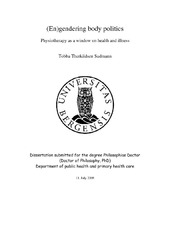| dc.description.abstract | The aim of this study is to gain knowledge about what patients do to negotiate possibilities and constraints for recuperative encounters with physiotherapists. The historical tenets of Norwegian physiotherapy are recapitulated and contemporary gendered specialisation and work division are presented. The theoretical underpinning of the study, critical hermeneutics and the sociology of everyday life, are tied together by coining play as pivotal for understanding and interaction, and by embedding small behaviours as part of language. Hermeneutic understanding depends on the interpreters’ background, comprised of symbolic, structural and subjective aspects. A focus group method is applied, construed as situated social gatherings: 4 groups of men, 4 groups of women, 26 women, 20 men, aged 18-77, comprising experiences with sports related injuries, chronic pain, heart or lung diseases, physical disabilities or medical unexplained disorders. Knowledge proposals: According to the participants, bodily changes and well-being depends on verbal, bodily and hands-on dialogues, and an attentive present therapist. The dialogical situation is precariously constructed; self presentation is planned to details and carefully enacted. Social institutions as gender imprint interaction, understanding and treatment. Pain is construed as action, and is a paradigmatic exemplar of how verbal, bodily and hands-on communication, self presentation and gender intersect in physiotherapy. Independent of age, gender or bodily concerns the participants challenge and negotiate cultural, medical or personal boundaries to enhance well-being and/or to reach personal objectives e.g. increasing pain for a greater good. The participants’ accounts are interpreted as intentional human agency, and reconstructed as body politics. Construing vulnerability as strength, the participants appreciate some of the benefits gained from living with bodily constraints and challenges. Their actions and enactments create new body idioms and new accounts of health/illness. Physiotherapy represents a field of practices where contradictory and covert social expectations reside. When social expectations are not met, patients may experience embarrassment, and recuperative interaction may be at risk. Social disruption may be ignored, remedied or laughed at. Laughter may be interpreted as a sign of embarrassment due to fragile interaction. By studying embarrassment and laughter we can listen for social dissonance, and imply some conditions necessary for the interaction to come off. Some necessary conditions are implied above; the participants, as patients, try to avoid embarrassing situations by asserting a personal body politics and warranting amendments to the interaction order of therapeutic encounters. | en_US |
